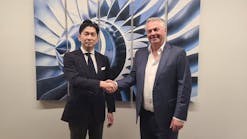Jan. 3—DULUTH — Cirrus Aircraft's leadership team expects 2023 will be another year of steady ascent for sales and production.
Cirrus CEO Zean Nielsen said the company is stretched, trying to keep pace with demand for its airplanes.
Despite significant production gains, he said, "Technically, everything we can produce the next two years is already sold."
"It's a supply chain and a manufacturing challenge we face primarily over the next couple of years, as we work through the backlog," Nielsen said. "We like to have some backlog, but it's exceptionally long right now, and we'd like to bring it down."
Cirrus currently has orders for more than 1,000 piston-engine airplanes and more than 300 jets. Its present rate of production is about 10 piston-engine and two jet-engine planes per week.
Nielsen said Cirrus has been working hard to reduce customer wait times, hiring more than 450 people in the past year, largely to fill production jobs in Duluth, where the company now employs more than 1,200 people.
Recently, Cirrus added a second production shift in Duluth.
"We want to make sure we fully utilize the footprint that we have — the buildings, the machines and so forth. And we have not yet fully utilized the second-shift option," Nielsen said, explaining that it will take time to fully staff that second shift and bring its production up to a level comparable to that of the first shift.
"We're trying to scale as fast as we can, but responsibly," he said.
"We don't want to scale so fast that our network can't keep up with servicing the airplanes, because you can produce a lot of airplanes, but if they don't come out into a world that's ready to receive them, they'll be orphans," he said.
Nielsen said in his former days as vice president of global sales operations for Tesla, the company was doubling production annually.
"When you do that, if you're not scaling the network to service those vehicles, or airplanes in our case, you can end up with a very bad customer experience. And we don't want that to happen," he said.
Nielsen said Cirrus cannot afford to go down that road.
"When you deal with high net worth individuals and a premium product of the price ticket that we deal in, you see your customers about every three years for new transactions, and everything in between is a service experience," he said. "That experience between transactions really, really matters. It has to be really great. Our philosophy is that it's not enough for our customers to like us. They have to love us."
Through the first nine months of this year, Cirrus delivered 366 airplanes with a combined sales totaling nearly $440 million, according to a report by the General Aviation Manufacturers Association. Sales were trending 15% higher than in 2021.
For all the many difficulties of the pandemic, it has created certain opportunities for the general aviation industry, serving primarily private, non-commercial pilots.
Nielsen explained that the pandemic has enabled more people to work remotely, and not being tied to the office has provided them with more flexibility to pursue a pilot's license.
"So, this influx of people who were dormant — they were interested in learning to fly and had the financial means to do it, they just didn't have the time — they've now found the time during the pandemic," he said. "Our flight schools are very busy, which is a good sign for future orders to come."
Cirrus has played an active role in helping people enter the general aviation world, a field where the washout rate has typically been about 90%. Nielsen said that if staff support can help lower that failure rate to just 80%, Cirrus will have effectively doubled its market of prospective new pilots, and the company prides itself on producing planes that are relatively easy to fly, even for newbies.
The continued struggles of commercial airlines have also presented an opportunity for general aviation, according to Nieisen. "When the airlines continue to cancel routes and flights, like they do, it's the best referral, because people still need to get where they're going, and eventually, they say: Enough of this. I'm just going to find an alternate way of traveling."
Cirrus' headquarters remain firmly rooted in Duluth, where the company recently doubled down by purchasing a former aircraft maintenance, repair and overhaul facility. And it's now investing north of $7 million to transform the 189,000-square-foot building into an R&D facility that Cirrus' has dubbed its "Innovation Center of Excellence."
As for Cirrus' commitment to Duluth, Nielsen said, "It's our home base, and we'd like to build on our strengths and utilize resources we have already invested in."
But he said the city's stagnant population, housing shortage and daycare needs remain a concern.
If these challenges hinder Cirrus' ability to recruit the workers it needs to grow, Nielsen said, "Then the choice is easy. Then, we will have to look for additional locations — not alternate locations — but additional locations."
Nielsen said Cirrus continues to work with city leaders and other businesses to help grow Duluth's population.
"It's not a problem that Cirrus can solve on its own. It has to be a village effort, if you will. But in so much that population growth is there, affordable housing is there, and there are enough good schools and daycare and talent, we want to continue to grow there, because all the infrastructure is in place," he said.
___
(c)2023 the Duluth News Tribune (Duluth, Minn.)
Visit the Duluth News Tribune (Duluth, Minn.) at www.duluthnewstribune.com
Distributed by Tribune Content Agency, LLC.

